IIT Roorkee develops structural colour-based sensors from agro-waste sugarcane bagasse
Ishita Ranganath | March 13, 2023 | 08:38 PM IST | 2 mins read
Research study by IITR has developed structural colour-based sensors that can reduce environmental harm caused by packaging.

NEW DELHI: A group of researchers from the Indian Institute of Technology Roorkee (IITR), department of polymer and process engineering have developed structural colour-based sensors by making structural colour from a natural resource, agro-waste sugarcane bagasse.
The research study led by IITR, department of polymer and process engineering, Pradip K Maji was published in ACS Applied Nano Materials. The group developed a structural colour-based stimulus-responsive sensor from Nano-cellulose having implications in intelligent packaging.
Also Read | IIT Roorkee researchers discover new antibacterial molecule 'IITR00693'
The color of the developed laminated films come from a ‘chiral nematic liquid crystal,' a specific molecular self-assembly that interacts selectively with specific colours of visible light. The lead researcher, Pradip K Maji emphasisied that the developed sensing chips show a dramatic change of reflection colour toward particular stimuli.
This development is a solution to sparkling hues like holographic, pearlescent, and iridescent effects causing environmental problems by using renewable resources like sugarcane bagasse. The nanocellulose suspension used in the sensores are non-toxic and are produced from readily available natural material, and therefore is highly suitable for upscaling.
The lead author of the published research, Chhavi Verms explained that as a team, the researchers have their set goals of sustainability to make the structural colouration approach feasible and commercially available, thus reducing the use of chemically based dyes and pigments.
Also Read | IIT Roorkee invites applications for MTech VLSI programme; Industry professionals eligible
This study becomes the first demonstration of a photonic film having potential as a candidate material having implications in bio-optical engineering and intelligent packaging.
Speaking about the research study, IIT Roorkee, director, KK Pant, said: "As pressure mounts for environmentally friendly products and services, the demand for eco-friendly packaging alternatives has skyrocketed. This approach to developing an environmentally friendly bio-inspired product can potentially act as a substitute to synthetic sensors."
Highlighting the key points of the research, IITR, department of polymer and process engineering, Pradip K Maji said: "The prepared sensors generate different colours in response to chemical stimuli and are very thin films, meaning minimal material is used. These films were further interlocked between layers of biopolymers to form a laminated structure having robust mechanical stability for intelligent packaging applications."
Follow us for the latest education news on colleges and universities, admission, courses, exams, research, education policies, study abroad and more..
To get in touch, write to us at news@careers360.com.